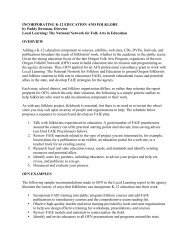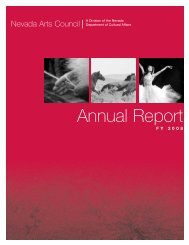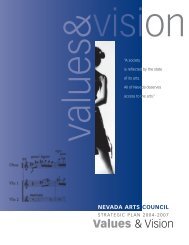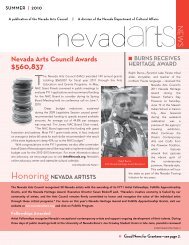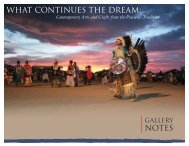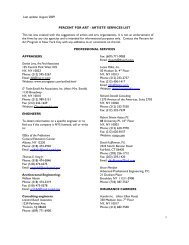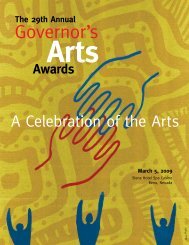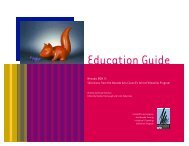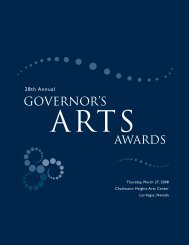Handed Down - Nevada Arts Council
Handed Down - Nevada Arts Council
Handed Down - Nevada Arts Council
Create successful ePaper yourself
Turn your PDF publications into a flip-book with our unique Google optimized e-Paper software.
1994–1995<br />
African Drumming:<br />
Mohamed Barrie and Eric Jackson<br />
The African American community in Las Vegas<br />
makes up about ten percent of the population,<br />
and has a long and sometimes difficult history dating<br />
back to the 1940s when migrants from Arkansas and<br />
Louisiana began arriving to work in war industries.<br />
There is a growing desire for cultural activities within<br />
the community as well as a need to share them with the<br />
rest of the city, and the establishment of a local citysponsored<br />
art center, several African American cultural<br />
organizations and a dance group called Children of the<br />
Diaspora African Musical Ensemble (CODAME) in<br />
recent years have all enriched the established culture of<br />
the community.<br />
An apprenticeship in African drumming which<br />
brought Mohamed Barrie from Sierra Leone to work<br />
with Eric Jackson provided another boost for African<br />
roots in Las Vegas. Mohamed is from Freetown, Sierra<br />
Leone, and began learning traditional dancing, drumming<br />
and storytelling from his father when he was only<br />
five years old. He is currently a member of the Freetown<br />
Players, a performing group that has been touring the<br />
US for several years.<br />
Mohamed explains that drums are integral to African<br />
culture: “The drum, it call you, it tell you everything.<br />
So the drum is more important back home, it is kind of<br />
the language, talking to people back home.” For dancers,<br />
the drum tells them when to<br />
move. “You don’t need to look at<br />
the lights or I’m waiting for my<br />
red light, or a ten count, no. The<br />
drum, as soon as the drum call<br />
them, that’s their language, it’s<br />
up to them, they don’t need to<br />
read or hear somebody say ‘Are<br />
you ready?’ You listen to the<br />
drum. That’s our own teacher,<br />
you know.” African dance is a<br />
very improvisational art form,<br />
and the dancers and drummers<br />
must work closely together as<br />
they create a performance.<br />
Apprentice Eric Jackson’s father is a drummer and<br />
he has been studying drumming for years, and specifically<br />
African drumming for the last three years or so.<br />
The first dance he learned from Mohamed was a harvest<br />
dance, which acts out the sowing and harvesting<br />
of rice, the principal crop of Sierra Leone. Mohamed<br />
insisted on teaching Eric the dance first because, “The<br />
lead drummer, he should know everything about the<br />
dance. He do everything, that’s why he need to know<br />
the moves, he need to know everything about the dance,<br />
the story, because he controls the dance, nobody else.”<br />
Mohamed also worked with the dancers of CODAME<br />
to teach the Harvest Dance while he was in Las Vegas.<br />
The integration of art into the everyday life of Africans<br />
was one of the strongest points Mohamed tried<br />
to make. “Let me tell you something about Africa,” he<br />
says. “If you know how to play the drum you should<br />
know how to dance, you should know how to sing, because<br />
it’s everyday life, you know. Like school, we play<br />
drums at school when we’re playing, tell stories, so before<br />
you grow up you should know how to tell stories,<br />
dance, play the drums, all those things.”<br />
Eric Jackson and Mohamed Barrie<br />
practicing African druming.<br />
31




